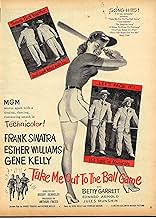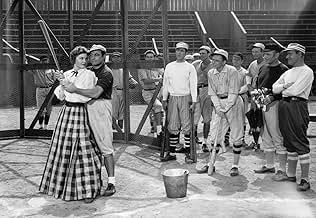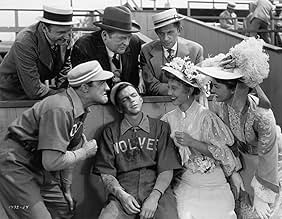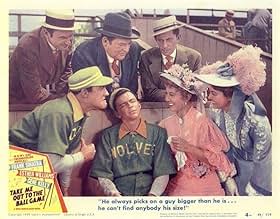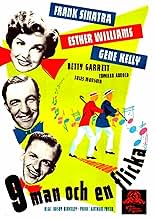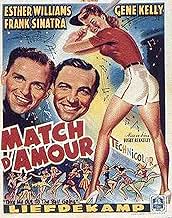Füge eine Handlung in deiner Sprache hinzuTwo turn-of-the-century baseball players, who work in vaudeville during the off-season, run into trouble with their team's new female owner and a gambler who doesn't want them to win the pen... Alles lesenTwo turn-of-the-century baseball players, who work in vaudeville during the off-season, run into trouble with their team's new female owner and a gambler who doesn't want them to win the pennant.Two turn-of-the-century baseball players, who work in vaudeville during the off-season, run into trouble with their team's new female owner and a gambler who doesn't want them to win the pennant.
- Auszeichnungen
- 3 Nominierungen insgesamt
- Dancer
- (Nicht genannt)
- Wolves Player
- (Nicht genannt)
- Zalinka
- (Nicht genannt)
- Girl in Bathing Suit
- (Nicht genannt)
- Kid
- (Nicht genannt)
- Girl on Train
- (Nicht genannt)
- Wolves Player
- (Nicht genannt)
- Wolves Player
- (Nicht genannt)
- Wolves Player
- (Nicht genannt)
- Wolves Player
- (Nicht genannt)
Empfohlene Bewertungen
It would be a lot easier for them to stick to their simple frustrations if they both didn't find themselves rapidly falling in love with Katherine as soon as she became their new owner. Along with the difficult task of trying to get their team, the Wolves, to win another pennant, the boys must find a way to control themselves around Katherine, as well as work out some sort of cogent lines for respect when it comes to flirting and mingling with her.
Punctuating this muddled relationship triangle are the film's most enthusiastic and accomplished features - its musical numbers. One of the first involves both Eddie and Dennis singing an infectious, harmonious ballad about past lovers called "Yes Indeed" with a ravishing song and dance number to accompany it. This is where the film finds its energy put to good use being that scenes that take place on the actual baseball field are slight and the relationship drama is overall petty and largely uninteresting. Having Kelly and Sinatra serve as vaudevillian performers in addition to rather narcissistic baseball players is a nice touch that works to lift the film out of whatever drudgery it would've succumbed to had it just been about the love triangle.
With that, Williams holds her ground quite nicely in a film that's populated and controlled by men and their raging hormones and pride. Her character's snarky comments and incorruptible demeanor makes her a dominant force in the film that doesn't make her easily fazed by the multitude of sexually charged comments being spewed her way for much of the film. As a result, she becomes an admirable presence with a great deal of energy and charm to offset the frequently simple-minded behavior of Eddie and Dennis.
Take Me Out to the Ball Game was the final film directed by Busby Berkeley, but was originally supposed to be directed by Gene Kelly and Stanley Donen. With Kelly's success as a performer, he was originally contracted by MGM to direct this film, but after the studio hired Berkeley to helm the project, Kelly and Donen were shifted to a screen writing credit by their producer Arthur Freed. As part of a compromise, Freed allowed Kelly to direct some of the musical scenes he did with Sinatra, despite leaving the bulk of the directorial duties to Berkeley. The result is a film that's charming through all its discombobulation, yet always watchable thanks to its gifted performers, especially Williams, who shouldn't be overshadowed by the performers with bigger names.
Starring: Gene Kelly, Frank Sinatra, and Esther Williams. Directed by: Busby Berkeley.
Lively, colorful musical from MGM's golden period. Kelly and Sinatra's dance numbers light up the screen even though the musical selections are largely undistinguished. This was Sinatra's career low period and he does look like he needs a good meal, which the movie parodies. Still his voice entertains, while his soft shoe is almost as good as Kelly's. It's a typical light musical plot of boys and girls meeting up, but then things get too serious near the end and go somewhat off track. Meanwhile, Mermaid Williams looks luscious in her gowns and even gets wet in a brief pool sequence. Still she manages the dance numbers, and without a back- stroke, no less. Williams may add glamour, but Garrett adds real spark. I just wish she got more screen time. On the other hand, the comical Munchin appears a matter of taste, failing to add much to the Kelly-Sinatra combo.
All in all, the Busby Berkeley musical shows earmarks of that golden period, even if it doesn't quite obtain front rank status.
The action is set in the first decade of the 20th century. Ed O'Brien (Kelly) and Dennis Ryan (Sinatra) are song-and-dance men in the winter and star players for 'The Wolves', a major league baseball team, during the summer. K.C. Higgins (Esther Williams) is a rich and beautiful young woman who buys the club and becomes involved in the personal lives of O'Brien & Ryan.
Baseball is the ideal setting for a nostalgic movie of this kind, and not just because it provides a team matrix in which to slot the male stars. Baseball has a venerable history to it, so the film can be set convincingly in the past. Kelly very nearly pursued a career as short stop with the Pittsburgh Pirates, and 'The Wolves', with their overwhelmingly Irish ethnicity, are fairly obviously based on the real-life Boston Redsox.
Busby Berkeley directs in a restrained, conservative style which suits this middle-of-the-road family entertainment. Esther Williams is terrific as Katherine. She sings, she dances, she acts - and yes, she even gets to swim! Sinatra crooning a romantic ballad to Esther is one of cinema's more unlikely permutations, but it happens here.
The songs are serviceable but little more, though the lyrics are sometimes amusing, pushing metre and rhyme into interesting contortions:
"I've gone and studied up on my astrology, I'm really knowledge-y!"
The only memorable song is the title number, but that dates back to the early 1900's. A clam bake on Giddy's Landing is all-American fun and gives scope for a big production piece. Notice how Berkeley makes the most of a cramped set by filming the chorus line at an oblique angle.
If this likeable but inconsequential film has some enjoyable moments (I liked the unsporting opponent tagging out the unconscious Ryan), it also contains a few curious editing decisions. At the end of the big number at the clam bake, there is a rapid forward-reverse 'hiccup', more usually seen in pop videos. In the latter part of Kelly's solo on the wharf, the scene strangely shifts to a new set. Both Shirley and O'Brien have distracting shadows across their faces in the protracted dancing on the wharf.
The end comes a little suddenly and without proper resolution, and then we get the rather oddly tacked-on vaudeville sequence. It all works, but with considerably less polish than its sister movie, "On The Town".
One is the story. Of course it features a love-story but the movie takes an original approach and takes a couple of nice turns with the love-story. Who is falling in love with who always remains a surprise in the movie.
Another reason is an obvious one; Frank Sinatra and Gene Kelly. Not only are they great genre actors but they're also great together. Especially Kelly delivers one fine performance. The female cast is also impressive by the way, with Esther Williams as the female lead.
Another important reason why this movie is so great is the cheerfulness of the whole movie. The songs are cheerful and never really too sappy or just plain awful. The movie has some great comedy moments and is also definitely helped by its fun main characters.
The movie sort of pays a great homage to the early days of baseball in America. The settings and premise work out fine for the genre and make the otherwise still somewhat formulaic storyline still come across as original.
The production values are also good and everything combined makes sure that this is a good pleasant bright musical comedy that is perfect to kill some time with and have a good time with at the same time.
8/10
http://bobafett1138.blogspot.com/
But instead of a battery, the story revolved around a double play combination of Gene Kelly, Frank Sinatra and Jules Munshin. Right in the same Teddy Roosevelt era the famous double play combination of Tinkers to Evers to Chance was doing great things for the Chicago Cubs. So it seems natural that a nice novelty number of O'Brien to Ryan to Goldberg seemed in order for this film.
Vaudeville and baseball are not complete strangers either. During the previous century Michael 'King' Kelly, colorful star catcher and base stealer for the Cubs toured in vaudeville. Rube Marquard the number two pitcher for the New York Giants in the second decade of the last century married musical comedy star Blossom Seeley and toured with her as part of her act before they broke up.
In fact the original idea in Take Me Out to the Ballgame was to have Leo Durocher play the Jules Munshin part. Of course it would have been a lot different role then. Durocher hung out with a lot of show business types, one of his best friends was George Raft. That got him in some trouble, but that's a story for another film.
Kelly and Sinatra essentially play the same roles they did Anchors Aweigh. Sinatra doesn't get as many good numbers as he did in that film, but he does have a very nice ballad, The Right Girl for Me who he thinks might be Esther Williams as he sings it to her. Of course Betty Garrett gets in the picture and she has some different ideas.
Esther Williams was not kind to Gene Kelly in her memoirs. She gets only one brief dip in a pool in a one piece bathing suit that was just being popularized at the time of this film by Annette Kellerman. Of course Esther later played Annette Kellerman in another film. She had a lot of trouble with the dance numbers because as she explained it, the muscles one develops for swimming are not the same as those needed for dance and she was really as she describes cruelly razzed by Kelly and Stanley Donen. She grew to dislike him intensely.
Kelly's best number is The Hat Me Father Wore on St. Patrick's Day, a nice Irish jig number that he does with style. Busby Berkeley directed the film, but the kind of mammoth musical number that typifies his work is only seen in the ensemble song, Strictly USA.
The plot involves some gamblers trying to fix the pennant race against the heavily favored Brooklyn Wolves, Kelly and Sinatra's team. Edward Arnold is the number one fixer. As we well know, gambling and baseball weren't strangers back in the day. Players were hardly paid what they are today and in the days before Kennesaw Mountain Landis became the first Commissioner, fixes were talked of in hushed tones. Kelly gets tricked and tempted.
Take Me Out to the Ballgame, the first good musical film on baseball, a harbinger for Damn Yankees and nice entertainment.
Wusstest du schon
- WissenswertesFrank Sinatra's career was struggling at the time and this was made during a period when the only time he did well at the box office was when paired with Gene Kelly. Two of his previous solo appearances, It Happened in Brooklyn (1947) and Ein Bandit zum Küssen (1948) did very poorly at the box office.
- PatzerDuring the Opening Day scene, the color of the opposing team's uniforms changes from gray & red to gray & green.
- Zitate
Eddie O'Brien: How many times have I told you to pick on somebody your size?
Dennis Ryan: There ain't nobody my size.
- VerbindungenEdited into Hollywood: The Dream Factory (1972)
- SoundtracksTake Me Out to the Ball Game
Music by Albert von Tilzer
Lyrics by Jack Norworth
Performed by Gene Kelly (uncredited) and Frank Sinatra (uncredited)
Reprised by Esther Williams (uncredited)
Top-Auswahl
- How long is Take Me Out to the Ball Game?Powered by Alexa
Details
- Erscheinungsdatum
- Herkunftsland
- Sprache
- Auch bekannt als
- La linda dictadora
- Drehorte
- Produktionsfirma
- Weitere beteiligte Unternehmen bei IMDbPro anzeigen
Box Office
- Budget
- 1.725.970 $ (geschätzt)
- Laufzeit1 Stunde 33 Minuten
- Farbe
- Seitenverhältnis
- 1.37 : 1
Zu dieser Seite beitragen



